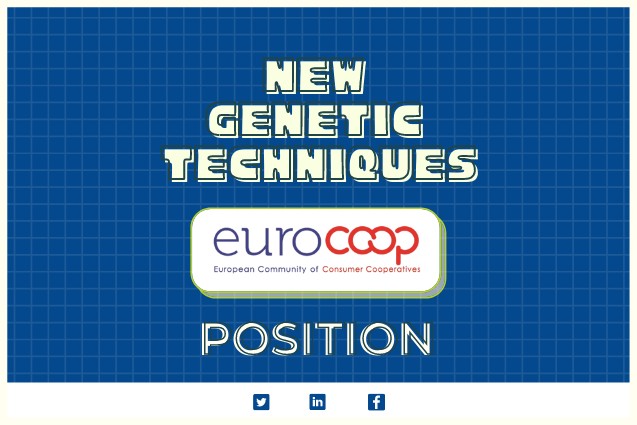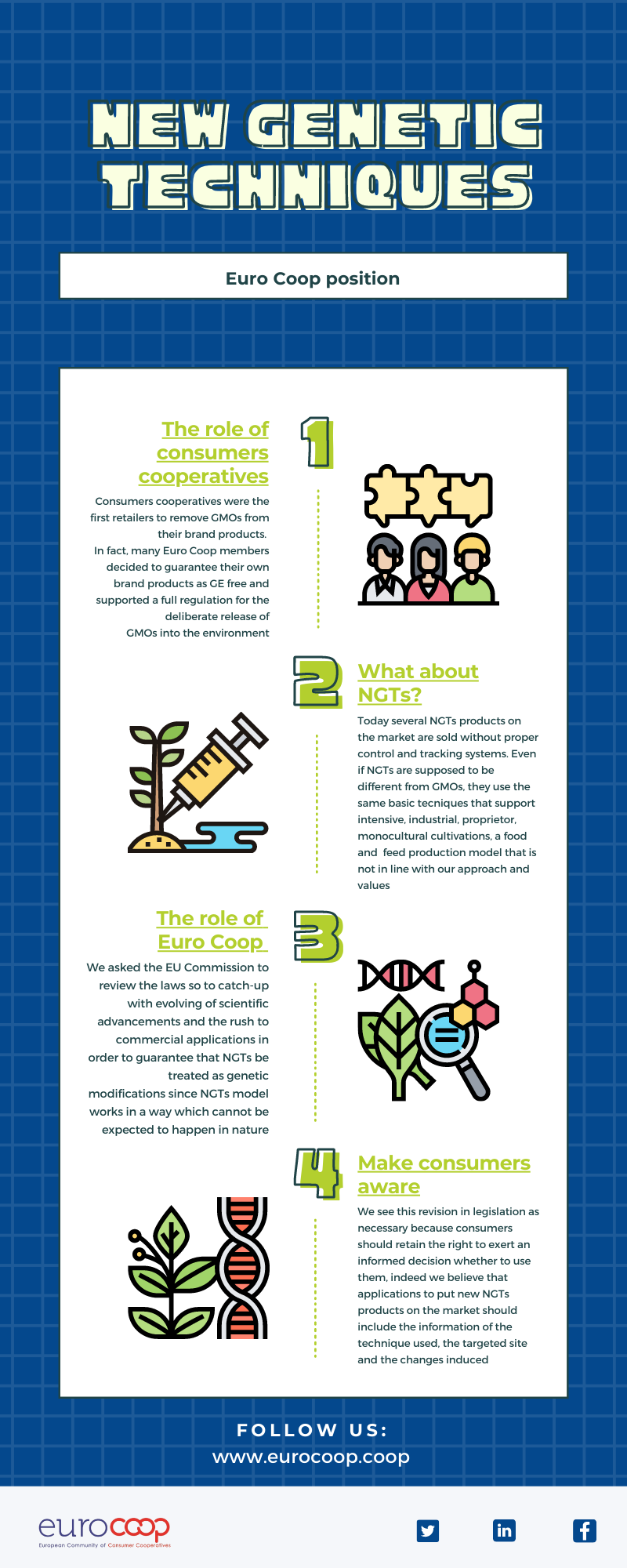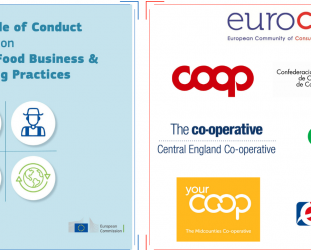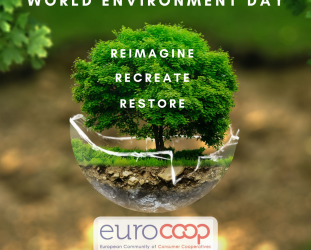New Genomic Techniques: Euro Coop’s position
16.02.2022 09:38:53

The number of NGTs products on the market is increasing: the application of new genomic techniques to several plant and animal varieties makes this a top priority at EU level. Our approach toward these new genomic technologies and their products is based on whether they offer valuable and socially sustainable solutions, whether the same results could be achieved by other means and to which extent they impact the freedom of informed choice for consumers.
MEPs call for dedicated EU research
In a letter addressed to the EU Commission, 31 MEPs recently asked for a dedicated EU research into the potential risks and analytical detection of genetically modified organisms engineered with new genomic techniques (NGTs) in food. MEPs stressed the necessity of a EU funded research in order to address the new challenges related to NGTs , in particular by developing state-of-the art risk assessment and detection methods. MEPs asked the EU Commission to urgently invest in EU research to investigate potential public health and environmental risks. as well as to develop detection and traceability methods to detect GM products across the food chain.
What do we know about NGTs
The NGTs aim at inducing small changes in the DNA by breaking it in localized areas of interest. This is achieved by using “molecular scissors” that cut the DNA at a given site. These molecular scissors are built outside the cell and NGTs use the same GMOs techniques for bringing them into the receiving DNA. With NGTs, changes at multiple locations of the genome are possible using different “handles” of the molecular scissor targeting several genes at once, or by repeated applications. Even though the scissor’s handles are able to recognize specific sequences on the DNA, the same sequences can be found elsewhere along the chain. If this involves genes whose function is to regulate the expressions of other genes, the results can be widely different than those expected. The irregularities observed as result of those changes seem to be specific to the NGT used.
Juridical interpretations
The Directive 18/2001 represents the main legislative act at EU level to regulate the deliberate release of GMOs, their traceability and the information to be provided to consumers for products made of, or containing, GMOs. The NGTs products, on the other hand, will easily escape the provisions if those won’t be updated to take into account scientific advancements in the field of genetic manipulation. NGTs supporters claim that new techniques and their products don’t fall under the Directive because they don’t involve the creation of recombinant DNA. Recently, the European Court of Justice was asked to deliberate on whether NGTs and their products should have been exempted by authorization procedures as provided by the Directive for varieties obtained by mutagenesis “conventionally used” and with a “long safety record”. The ECJ concluded that, because NGTs make use of molecules assembled outside the cell in a way which cannot be expected to happen in nature, qualifies them as transgenic techniques as defined by the Directive.
 Our point of view
Our point of view
Because of these considerations, Euro Coop asked the EU Commission to review the laws in order to clarify some ambiguous terms, to include NGTs among transgenic techniques and their products among GMOs and to extend the research of unexpected changes and effects of NGTs by supporting a wider use of the so called “omics” sciences and techniques. Taking into account the specificities of NGTs and in order to fully implement the Directive 18/2001, authorization procedures should at least include the compulsory disclaim of the targeted DNA sequence, the technique used, on target and off-target effects and how they’ve been determined. Therefore, Euro Coop encourages to improve plant varieties and animal races by applying the advanced knowledge of genetics and molecular biology to speed up the selection procedures among progenies obtained through natural breeding (i.e. Marker Assisted Selection, microsatellites, SNPs etc).
Euro Coop sees this revision in legislation as necessary because consumers should retain the right to exert an informed decision whether to use them. To this intent, it is important to underline that consumer co-operatives were the first retailers to remove GMOs from their brand products. In fact, many Euro Coop members decided to guarantee their own brand products as GE free and supported a full regulation for the deliberate release of GMOs into the environment.
Interesting reading: MEPs letter to the EU Commission
Latest Sustainability Policy news

Euro Coop Joins +140 Organizations in Urgent Call to Preserve EU Green Measures
Euro Coop stands alongside 140+ civil society organisations in a crucial plea to EU...

EU Overshoot Day - Euro Coop urges EU leaders to tackle the nature, climate and pollution crises
Today marks the EU’s overshoot day, signifying that if global consumption mirrored EU...

Manifesto for agricultural transition to address systemic climate crises
Euro Coop, together with 12 civil society organisations call on the European Institutions to...
Latest Sustainability Policy stories

Euro Coop's New Publication: Addressing the Global Food Waste Crisis on International Day of Awareness
On the occasion of the 2023 International Day of Awareness on Food Waste and Loss, Euro Coop...

Press Release: EU Code of Conduct
Today, the European Commission unveiled the long-awaited EU Code of Conduct on Responsible...

World Environment Day 2021
This year’s World Environment Day marks a perfect opportunity to...

